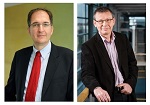Antimalarial Agent from Plant Waste - International “Humanity in Science” Award for Malaria Research from Berlin and Magdeburg
 13.03.2015 -
13.03.2015 -
The chemist and biochemist Prof. Dr. Peter H. Seeberger and process engineer Prof. Dr.-Ing. Andreas Seidel-Morgenstern have been granted the prestigious international "Humanity in Science" award. Seeberger, director at the Max Planck Institute of Colloids and Interfaces in Potsdam and professor at the Free University of Berlin, and Seidel-Morgenstern, director at the Max Planck Institute for Dynamics of Complex Technical Systems Magdeburg and professor of Chemical Engineering at the Otto-von-Guericke University Magdeburg, were honored for their "groundbreaking work on new production methods for malaria drugs.”
The "humanity in science" award was presented to the two at a gala on 10 March 2015 in New Orleans, USA. The prize is worth $25,000 (22,500 euros, converted). The award is sponsored by the trade journal "The Analytical Scientist " and the separation technology manufacturer Phenomenex. Both scientists have developed a production method for the antimalarial agent artesunate, in which the purified active ingredient is produced from plant waste, air, and light. The success is due to the collegial cooperation of both dedicated researchers, who saw the opportunity to contribute something essential to combat malaria.
Prof. Dr.-Ing. Andreas Seidel-Morgenstern: "My colleague Peter Seeberger spoke to me after his first success. He had succeeded in the continuous flow synthesis of the plant-derived active ingredient from the waste materials of the previous extraction. He asked if we in Magdeburg were interested in developing a continuous purification for the continuous synthesis. Since malaria is especially common among the poor, we tried to develop a very inexpensive yet at the same time highly effective purification."
Prof. Peter H. Seeberger stresses: "The method developed by the team led by Andreas Seidel-Morgenstern is amazingly simple, yet highly effective. Further success came along in a ping-pong process: We also managed to produce the most important antimalarial drugs that are produced from artemisinin - ie the materials that go into the tablet - directly in the reactor. Then the scientists led by Andreas Seidel-Morgenstern were able to purify these active substances continuously, as well."
As such, the active ingredient yield from the plant was more than doubled. At the same time, the production costs significantly decrease. The purity of the finished drug - in other processes often a problem - is 99.5 percent.
The industrial implementation of the patented process is being driven by an established company, Artemiflow GmbH. For this purpose, a production plant in Vietnam is currently being built.
Professor Seeberger: “In Vietnam, we have found a private investor, and our work has awoken the interest of the Vietnamese government. Vietnam has almost eradicated malaria in their own country through clever campaigns – that's an admirable achievement! There, our technology will secure the existence of thousands of Vietnamese farmers, who cultivate Artemisia annua, the plant which supplies the raw material for the drugs. And Vietnam wants to help the Africans in a South-South-cooperation, in also combating malaria in Africa more effectively and cheaper.
Because there was no support beyond fundamental research, which was funded by the Max Planck Society, we ourselves had to become entrepreneurially active, to realize the technology on an industrial scale. It is the cooperation with an emerging country that could now benefit malaria patients, "says Seeberger.
The Humanity in Science Award
The Humanity in Science Award is an international award, which was brought to life by the separation technology manufacturer Phenomenex and the trade journal "The Analytical Scientist." Scientists are honored for achievements in analytical science, that have a substantial impact on the health and welfare of mankind worldwide. Technology, a process, or a product that crucially influences, for example, food or water safety, pharmaceutical developments, internal security, biofuels or other relevant applications can win the award. The annual award was presented this year at Pittcon 2015 in New Orleans, the largest conference for laboratory sciences, for the first time.
(Source: (http://www.mpi-magdeburg.mpg.de/2897329/2015-03-11_Humanity_in_Science_Seidel_Morgenstern)'
Image Source: Max-Planck-Institut Magdeburg / Bastian Ehl





